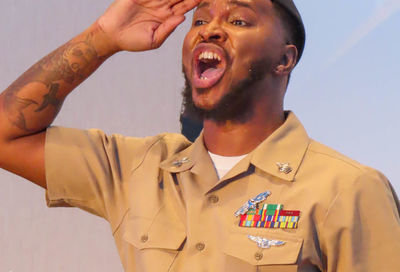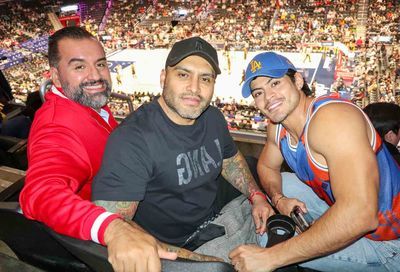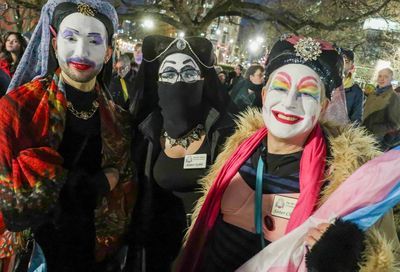Here come the chatans
Rabbis discuss same-sex commitment ceremonies at D.C. Jewish Community Center
Long before December 2006, when a panel of rabbis on the Conservative Movement’s committee on Jewish law and standards voted in to allow individual seminaries the option of ordaining gay rabbis and sanctioning same-sex commitment ceremonies, Rabbi Bradley Shavit Artson was fighting for the cause.
Artson, Dean of the Ziegler School of Rabbinic Studies in Los Angeles, was in Washington Saturday, June 16, to accept the first Leadership Award from the Washington D.C. Jewish Community Center’s Kurlander Program for Gay & Lesbian Outreach and Engagement (GLOE). The group also celebrated its first anniversary at the event, dubbed ”My First Big Gay Jewish Wedding.”
”Rabbi Artson is a recipient of the award because he epitomizes the type of courage we often hear about or talk about but don’t see very often,” said Stuart Kurlander, founder of GLOE.
Artson was honored for writing and submitting his opinion to the Conservative committee in 1992, requesting that they sanction the gay ordination of rabbis and remove the ban on gay sex. He was also honored for declaring, in January 2007, that Ziegler, one of only two Conservative rabbinical schools in the U.S., will accept openly gay and lesbian students into their programs as rabbis and cantors, and that the graduates can officiate at same-sex ceremonies.
Artson was grateful, while pointing out that on some level he considered the award to be ”nonsense.”
”Sometimes we award people because they do extraordinary things that are just objectively extraordinary, but I don’t think saying that God loves everybody, and that Jewish tradition should reflect that insight, is extraordinary, except for the mere coincidence that not everybody seems to get that,” he said.
In 1983, Artson, whose sister had recently come out to him, began attending the Jewish Theological Seminary of America (JTS) in New York, with a dilemma.
”How does a Jew, who loves the Torah, and who accepts that God speaks to us through [the] Torah, reconcile that with the plain and simple fact that my sister is beautiful as she is?”
Artson used a final-exam writing assignment to answer that question.
”I committed to the [idea that the] Torah reflects God’s love and God’s justice, so the Torah cannot be cruel. That means we are reading it wrong. So that forced me to start reading about gay history and legal theory and I wrote what ended up being a 45-page paper,” he said.
While he ended up earning an A on the assignment, the two words of comments from the professor left a lasting impression. The words were ”Excellent” and ”Wrong.”
At that time, says Artson, the chairman of the committee on Jewish law and standards was working to implement a permanent ban on same-sex unions, but wouldn’t do so without presenting both sides of the argument. Since no ordained rabbi was willing to argue in favor of gay marriage, Artson’s professor submitted his 45-page-paper to present the pro-gay side. Artson recalls the reactions, including one incident that occurred in the JTS cafeteria.
”I was sitting and supping my soup, innocently I thought, and a pair of pants came up next to me and a voice up there said, ‘Are you Brad Artson?’
”I turned to the pants and said, ‘Yes.’ Then the voice just started shouting, and I never looked up to see who was connected to the pants. It never seemed there was a reason to. At some point the shouting stopped and he moved away. But that happened more than once, where people would just unburden themselves [on me].”
In addition to honoring Artson for his work, GLOE’s event also featured three local rabbis who shared their personal experiences and thoughts regarding same-sex commitment ceremonies.
Michael Singer, a member of GLOE, and moderator of the event, said the ”huppah,” the marriage canopy under which the couple to be married sits during the wedding ceremony, is on four poles for a reason: ”It’s portable.”
”Tonight we’re going to learn about how a traditional Jewish wedding [huppah] is now being moved to new places, to shelter two men, or two women, who now have the right to celebrate their union to one another under Jewish law,” Singer said.
Jeffrey A. Wohlberg, the senior rabbi at Adas Israel, the largest conservative synagogue in D.C., expressed his concerns with conducting same-sex ceremonies, including the difficulty in issuing a ketubah, the traditional Jewish marriage contract, which uses terminology that involves the commitment between a man and woman.
”Do you just paste over little word[s] that you don’t like, or do you make a new document which is unique to this kind of ceremony?” Wohlberg asked. ”And where do you register this? What do you call these ceremonies? Do they have names? They don’t yet. Not in Hebrew. These are kinds of questions that my community is dealing with. Are they simple matters? No. Are they complex matters? Absolutely.”
Rabbi Bob Saks from Washington’s only GLBT congregation, Bet Mishpachah, said the Conservative movement is ”playing catch up,” and has not caught up yet.
”The Conservative movement does not understand how offensive it is for them to have been debating whether GLBT people can serve as rabbis,” he said.
”These discussions take place as if no one is listening. As if there are no impressionable young people, who read the paper, who hear the discussions… as if no one’s feelings are hurt, as if no one is driven to suicide, by the sense that the religious movement that they’ve grown up in, does not value them, and does not fully accept who they are as human beings.”
In performing same-sex commitment ceremonies, Saks said he often finds that gay and lesbian couples want to keep the ceremony as traditional as possible.
”It’s particularly meaningful, to the same-sex couples, to know that the traditional ceremony, the traditional language, the traditional ritual, are open to them, and could be fully shared with them. That something different … does not have to be created on their behalf.”
Rabbi Toby Manewith, from Temple Micah, a reform synagogue in Northwest that offers a GLBT outreach group called Kulanu, also officiates same-sex commitment ceremonies.
Some couples have asked Manewith to incorporate an eighth blessing in addition to the seven traditional blessings that make up the ceremony.
”It’s basically about hoping for the day when [their ceremony] isn’t different,” she says. ”It’s hoping for the day when this is just what is.”
For more information visit www.washingtondcjcc.org/gloe.
Support Metro Weekly’s Journalism
These are challenging times for news organizations. And yet it’s crucial we stay active and provide vital resources and information to both our local readers and the world. So won’t you please take a moment and consider supporting Metro Weekly with a membership? For as little as $5 a month, you can help ensure Metro Weekly magazine and MetroWeekly.com remain free, viable resources as we provide the best, most diverse, culturally-resonant LGBTQ coverage in both the D.C. region and around the world. Memberships come with exclusive perks and discounts, your own personal digital delivery of each week’s magazine (and an archive), access to our Member's Lounge when it launches this fall, and exclusive members-only items like Metro Weekly Membership Mugs and Tote Bags! Check out all our membership levels here and please join us today!






















